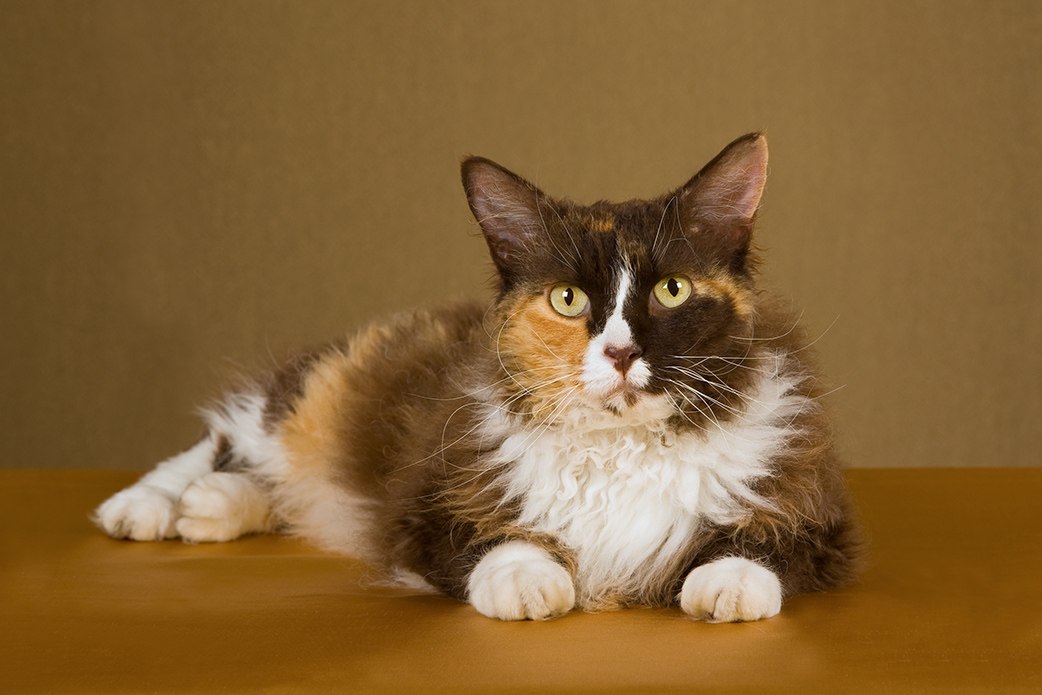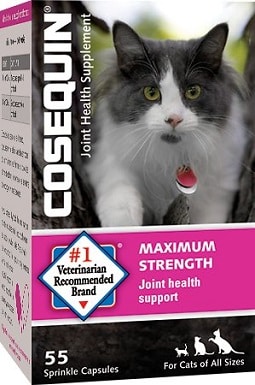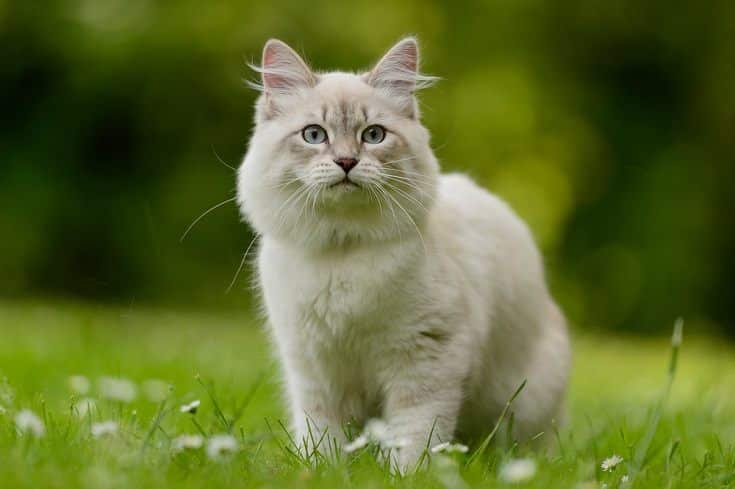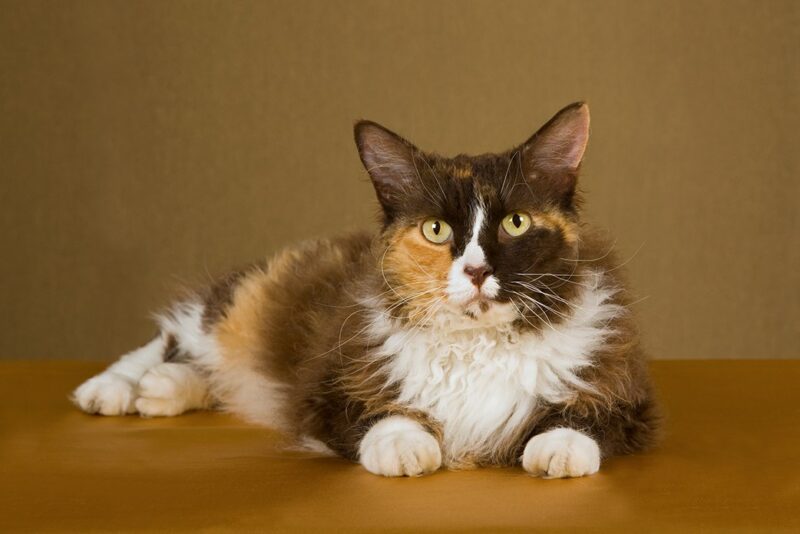
Glucosamine supplements are easy to come by and are available as pills, liquids, chews, and capsules. But which glucosamine supplements are the best? We decided to examine the most popular brands to find out which came out on top. We identified seven excellent brands that we want to share with you! Here are our reviews of the best glucosamine supplements for cats.
A Quick Comparison of Our Favorites (2024)
| Image | Product | Details | ||
|---|---|---|---|---|
| Best Overall |

|
Nutramax Cosequin Capsules Joint Health |
|
CHECK PRICE |
| Best Value |

|
NaturVet VitaPet Senior Glucosamine Cat Soft Chews |
|
CHECK PRICE |
| Premium Choice |

|
PurePaw Nutrition Premium Dream Glucosamine |
|
CHECK PRICE |

|
NaturVet Glucosamine DS Cat Soft Chews |
|
CHECK PRICE | |

|
VetriScience Laboratories GlycoFlex Supplement |
|
CHECK PRICE |
The 7 Best Glucosamine for Cats
1. Nutramax Cosequin Capsules Joint Health Cat Supplement — Best Overall

Nutramax Cosequin capsules keep cartilage from breaking down while supporting the healthy production of new cartilage as your cat ages. Cosequin is a natural supplement that is completely safe for cats, so you do not have to worry about dealing with any side effects with regular use.
Cosequin is thought to support joint health and relieve cats suffering from arthritis. It may also prevent urinary tract infections. Nutramax is safe for cats of all ages and can be administered as a capsule or sprinkled on food at mealtime, making it easy to treat picky cats.
The capsules are stored in an airtight bottle that is easy to open. Unfortunately, it is not fast-acting for all cats, depending on their overall health. It may take a few weeks to start seeing improvements in your cat’s health. Overall, we think this is the best glucosamine for cats available.
- Capsules are easy to administer
- Features all-natural ingredients
- Safe for cats of all ages
- It can take weeks to see the results
2. NaturVet VitaPet Senior Glucosamine Cat Soft Chews — Best Value

Formulated by veterinarians and made in the United States, NaturVet VitaPet senior glucosamine soft chews are designed for senior cats. However, the soft chews are safe for kittens over 12 weeks of age. NaturVet VitaPet is the best glucosamine for cats for the money because it contains a range of essential vitamins and minerals to support a healthy immune system.
Each package contains a 30-day supply, so you do not have to order them often to stay stocked. These wheat-free chews are soft and formulated to provide a flavor that cats cannot resist.
In fact, the treats are so tasty that cats have been known to eat too many if they have access to an open container, which could cause adverse reactions. Therefore, NutraVet chews should be stored in a cabinet.
- Includes essential vitamins and minerals to support overall health
- Made specifically for seniors but suitable for all cats over 12 weeks old
- The package contains a 30-day supply
- Cats will ignore regular food if they eat too many
3. PurePaw Nutrition Premium Dream Glucosamine — Premium Choice

PurePaw is suitable for dogs and cats and ideal for multi-pet households. The glucosamine helps rebuild joint cartilage and reduce inflammation so your canine is comfortable as they age. PurePaw Nutrition Premium Dream also contains CoQ10, hyaluronic acid, and vitamin C to support a healthy heart and immune system and to relieve allergic reactions.
It comes in a liquid and has no taste, so it can be mixed into food or poured on treats, and your cat likely will not even know that it is there. PurePaw is made in the United States and can be stored on a shelf because no refrigeration is necessary. The biggest downside is that the formula is expensive compared to many other brands on our list.
- Suitable for cats and dogs
- Supports joint, heart, and immune health
- Taste-free for easy administration
- More expensive than other options on our list
- Administration can be messy
4. NaturVet Glucosamine DS Cat Soft Chews

This is another product that caters to cats and dogs. It is designed to provide hip and joint support so daily exercise is more enjoyable. In addition to glucosamine, NatruVet soft chews contain chondroitin and MSM, which work to strengthen the connective tissues for better flexibility and movement overall. Antioxidants are included to kill free radicals that can damage your cat’s joints as time goes on.
The chewable tablets may have to be hidden in treats to get your cat to take them. However once ingested, the formula is time-released for long-lasting effectiveness. The package contains 120 chews, and most cats need only one chew each day for optimal results. The biggest problem we encountered was that the container did not seem airtight, which could dry the chews out over time.
- Designed to provide both joint and hip protection
- Includes chondroitin and MSM
- Time-released for long-lasting support
- The chews do not seem to be appealing to cats
- The container does not close airtight
5. VITAFUL PetJoint Turmeric & Glucosamine

VITAFUL PetJoint is more than just a glucosamine supplement. It contains turmeric as an anti-inflammatory and curcumin, which works powerfully as an antioxidant. This formula is hypoallergenic and designed to relieve pain in joints and bones. It also helps relieve minor joint stiffness, so playing and climbing are more enjoyable.
The soft chews are naturally flavored with irresistible bacon and liver, so there is no need to sneak them into your cat’s meals to get them to digest them. Most cats love the chews so much they can be used in place of treats once daily. You will not find corn, wheat, soy, or grains in the ingredients list. However, the VIAFUL formula may not work well for cats with severe joint and hip problems.
- Supports joint health and relieves minor stiffness
- Naturally flavored with bacon and liver
- May not provide results for cats with severe joint problems
- The chews may have to be split in half because they are a little too large for smaller cats
6. VetriScience Laboratories GlycoFlex Supplement

This glucosamine product is specially designed for cats and works to strengthen their back legs within just a few weeks. The small chews look like the average treat, and because they are flavored with real chicken, most cats cannot resist them. As the name suggests, Vetriscience Laboratories GlycoFlex is proudly formulated using thoroughly researched scientific data to ensure positive results in older cats.
With New Zealand green-lipped mussels, this supplement provides impressive anti-inflammatory benefits that make getting around easier for cats with sore joints. The packaging is subpar, so you will probably have to store the supplements in another container after opening it for the first time. Also, Vetriscience does not contain some of the beneficial ingredients, like turmeric, that other brands on our list do.
- Designed specifically for cats to strengthen their hind legs
- Includes New Zealand mussels for anti-inflammatory support
- The packaging is subpar and does not seem to stay closed once opened
- Does not contain as many helpful ingredients as other options on our list
7. Pet Naturals Hip + Joint Supplement

In addition to glucosamine, this supplement is filled with chondroitin, Perna canaliculus, and MSM, not only to relieve joint pain but also to help restore joint development and movement so your cat can play like a kitten again. The chews are fish-flavored and shaped like little fish, which is fun for us but not necessarily impressive to cats.
Formulated by veterinarians, Pet Naturals Hip + Joint supplements are made without artificial ingredients or fillers like corn. However, a few unnecessary ingredients, such as canola oil, are included. Also, the supplements can result in strange-colored stools that can be alarming.
- Formulated by veterinarians
- Restores joint development and movement
- Includes unnecessary ingredients, such as canola oil
- May produce strange-colored stools
Buyer’s Guide: Choose the Best Glucosamine for Cats
Choosing a glucosamine supplement for your cat is a serious decision. You must ensure the supplement does not disagree with your furry family member’s digestive system or make them nauseous.
You also must ensure that the supplements you give them do not interfere with medications that they are already taking. In addition to checking out the recommendations on our reviews list, there are a few other things you can do to optimize your success with the glucosamine supplements you choose.
Consider Your Cat’s Symptoms
One important thing to do before choosing a glucosamine supplement for your kitty cat is to consider all the signs that they are displaying. Do they have minor discomfort while moving around or difficulty getting up and lying down?
Does your cat bite, nip, or growl when you try to touch their legs? Is their fur looking dry and falling out? Does their immune system seem to be taking a hit? Are allergies making things worse for them?
Many glucosamine supplements contain extra ingredients, like CoQ10, which works as an anti-inflammatory and supports neurological health. Turmeric is another anti-inflammatory that is included in some glucosamine supplements.
Other supplements contain antioxidants to improve the immune system and enhance overall health. Understanding all the signs your cat is dealing with will help you better decide which ingredients to look for when choosing a glucosamine supplement.
Understand Your Cat’s Preferences
If you are not used to giving your cat supplements, you likely do not know what kind of supplement they will most easily accept. Would it be a pill, a chew, powder, or liquid? It is a good idea to find out before spending money on glucosamine supplements.
Avoid Artificial Stuff
When comparing glucosamine supplements to one another, it is vital to stay away from artificial ingredients. Any supplement that includes artificial ingredients should be immediately discarded from your list because you do not know where the ingredients were derived from.
Also, artificial ingredients such as ethoxyquin can be harmful to your cat’s health if consumed regularly. There are plenty of glucosamine supplements on the market that are free of such ingredients. Just read the label to be sure.

Think About Storage
Not every glucosamine supplement product is packaged the same way, so you should consider how you want to store the supplements. Some products are packaged in plastic pouches designed to reseal between uses, but they are not always reliable, so you may have to transfer the supplements into a separate sealable container.
Other products come in plastic containers with screwtops, cardboard boxes, or single-serving packets. Some products must be stored in the refrigerator, while others can be kept on the shelf.
Always Consult With Your Veterinarian
Even though glucosamine supplements should not cause adverse reactions in your cat, it is a good idea to consult your veterinarian before administering them. Your veterinarian can tell you whether there are any ingredients to stay away from or look for, depending on your cat’s health. If necessary, they will schedule a check-up to make sure your cat is dealing with joint and arthritis problems instead of something more serious.
They may recommend medications that your cat can take in addition to glucosamine supplements. If anything, getting the green light from your veterinarian will give you peace of mind in knowing that you are providing your pet with the best care possible.
Conclusion
If your kitty needs glucosamine to feel more vibrant, you have come to the right place. While we feel that every brand featured on our reviews list is worthy, we highly recommend our first and second picks. Nutramax Cosequin Capsules are all-natural, easy to administer, and safe for cats of all ages.
They are also designed for long-lasting, year-round relief. NaturVet VitaPet Senior Glucosamine Soft Chews are made for seniors but suitable for any cat over 12 weeks old. It is designed to support a cat’s joints and immune function.
No matter which supplement you decide to give your cat, you can rest assured that you are providing them with natural ingredients to improve their overall quality of life. Which glucosamine supplements do you think will work the best for your kitty cat? Let us know what you think in the comments section below!
Featured Image Credit: Linn Currie, Shutterstock
Contents
- A Quick Comparison of Our Favorites (2024)
- The 7 Best Glucosamine for Cats
- 1. Nutramax Cosequin Capsules Joint Health Cat Supplement — Best Overall
- 2. NaturVet VitaPet Senior Glucosamine Cat Soft Chews — Best Value
- 3. PurePaw Nutrition Premium Dream Glucosamine — Premium Choice
- 4. NaturVet Glucosamine DS Cat Soft Chews
- 5. VITAFUL PetJoint Turmeric & Glucosamine
- 6. VetriScience Laboratories GlycoFlex Supplement
- 7. Pet Naturals Hip + Joint Supplement
- Buyer’s Guide: Choose the Best Glucosamine for Cats
- Consider Your Cat’s Symptoms
- Understand Your Cat’s Preferences
- Avoid Artificial Stuff
- Think About Storage
- Always Consult With Your Veterinarian
- Conclusion














